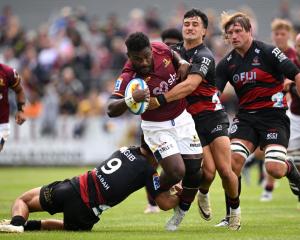Doug Harvie will step down from the Otago Rugby Football Union's board with the sport in a much better position than when he arrived. Rugby writer Steve Hepburn catches up with the departing former chairman.
Doug Harvie had his eyes wide open when he went into the job as chairman of Otago Rugby.
He knew it was going to be tough.
And that is exactly what he got.
After all, this was an organisation which had come within a cat's whisker of going into liquidation a couple of months before Harvie became chairman.
''They were dead and gone. There was nothing there. Everything had stopped. The Otago board had nearly gone into liquidation and they had made the wise decision to stop,'' Harvie said.
''That first year was really tough. We had to put everything in perspective.
"We had all come in cold apart from a couple of continuing board members. We had to learn everything. A lot of hours were put into it.''
Harvie, a Dunedin chartered accountant, became chairman of the newly structured board in May, 2012.
He was shoulder-tapped to stand and felt he could not say no.
''I believed then, and I still do, that it is a crucial infrastructure for Otago and New Zealand. I did not want to see it go down.''
Harvie (57), a former loose forward for the University and Dunedin clubs, said the new board did not want to look back on why it found itself in such a tough position.
It was focused on getting the business of rugby back into a good shape in Otago.
''The passion and love for rugby was still there, club rugby was still there, but the business side was missing.
''It had just disappeared ... Our job was to pull that together and make sure it did not disappear. A lot of people were involved in doing that.
''There were big hours. Just a lot of work making sure everyone was on the same path. I was involved in the governance and the structure of that and there was nothing there.
"We had to create something. We asked for a blueprint from the NZRU on board governance and board protocol but they didn't have anything. As far as we were concerned we were in the dark, just starting from scratch.
''It took a long time. We did not have any previous knowledge to know what to do.''
Harvie said once a management team was put in place things started to turn around.
Costs were reined in and any money spent had to accounted for.
''We had a simple message from day one. If it is not in the budget then it can not happen. That was our philosophy.''
Harvie certainly got things right and quickly.
The union produced a profit of more than $400,000 for 2013 and is likely to again produce a positive result for last year.
Rugby in Otago was not all about how the Otago team fared in the ITM Cup, he said.
''It's never been about the game. It's about the kids, about the clubs, the playing of the game. That's what it is all about. About growing the game. Getting more people playing.
''Otago did not have a great year [in the ITM Cup last year] but our KPIs [key performance indicators] as a board came out at 86% which was pretty good for us.''
The union had a philosophy of picking home grown talent out of club rugby and it was not going to change.
Spending more money on players often cropped up at board level.
''The accountants will say no while the rugby people on the board will say yes. That is what we have to debate. But that is sport. You have to have a winner and a loser.
''I've never accepted buying players. These players are just mercenaries. If they come here for the money what is to stop them going somewhere else quickly for more money? You're better off looking within - getting home-grown players.
''You can't win everything. I don't lose any sleep if we don't win a game.''
Harvie has one obvious highlight in his tenure - Otago winning the Ranfurly Shield in Hamilton in 2013.
''I was lucky enough to be with a group of people up there. It was disappointing for Waikato having such a small crowd there. But it was a great time for us.
''It was a shame we lost it straight away but look at how it has helped those unions. Hawkes Bay, Counties-Manukau, it has really helped them out.''
He said the rugby landscape had changed greatly in the past years.
''Even in the three years I have been involved player salaries have been reduced across all the provinces. The provinces realise it is not a fully professional competition.''
Harvie is not lost to the rugby board room when he steps down at the union's annual meeting in a few weeks.
He is chairman of the Highlanders and had been involved in the licensing agreement for the franchise in the past few months.
He said that was progressing and an announcement was due shortly.
It is a job he will stay with until the end. Harvie, who stood down as Otago chairman last year to concentrate on the Highlanders role, is not one to shy away from a task.
''That [Otago chairman] took over my life there for a while. It was pretty tough but I was never going to walk away.''












